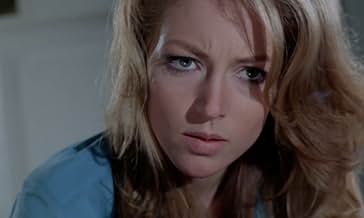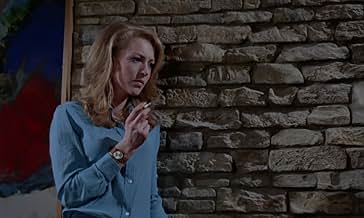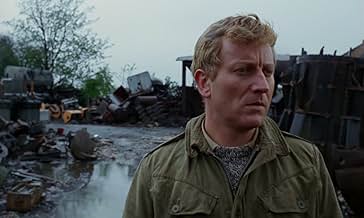IMDb-BEWERTUNG
6,9/10
2257
IHRE BEWERTUNG
Füge eine Handlung in deiner Sprache hinzuA group of British criminals plan the robbery of the Royal Mail train on the Glasgow-London route.A group of British criminals plan the robbery of the Royal Mail train on the Glasgow-London route.A group of British criminals plan the robbery of the Royal Mail train on the Glasgow-London route.
- Auszeichnungen
- 1 wins total
Patrick Jordan
- Freddy
- (as Patrick Jordon)
Kenneth Farrington
- Seventh Robber
- (as Ken Farrington)
Roger Booth
- Detective
- (Nicht genannt)
Ron Charles
- Seaman
- (Nicht genannt)
Empfohlene Bewertungen
British Peter Yates drove race cars before becoming a director and turning out some pedestrian work and a couple of respectable films, including this one and "Bullitt." Steve McQueen, another racing aficionado, having seen the spectacular car chase through the streets of London in this film, invited Yates to direct him in "Bullitt" the following year, and there is a certain concordance between the two. "Bullitt" (1968) is superior. The interrelationships are more subtle, the musical score more apt. The score in "Robbery" shrieks "generic thriller" and lacks anything like the sophistication of the flute trio in San Francisco's chic Coffee Cantata. And if the car chase in "Robbery" is thrilling -- and it is -- the high speed pursuit in "Bullitt" provides a touchstone for all the car chases that followed, from "The Seven Ups" to "The French Connection." There was never anything like it before.
Basically, "Robbery" has Stanley Baker in charge of one of those gangs consisting of specialists, one expert in electronics, another in laundering, another who knows how to be a locomotive engineer, and so forth. The heist of more than three million pounds from the Royal Mail train is tense, engaging, and a little confusing. The confusion is compensated for by the many times we see references to "Royal Mail," which sounds infinitely better than "U. S. Postal Service." "Royal Mail." It doth roll trippingly from the tongue.
No guns are displayed or used, in contrast to "Bullitt", and even in the later film there are only two brief scenes involving gunplay. The fact is that guns aren't always necessary in robberies like the one described here. Imagine, two freaky looking dudes wearing black ski masks and threatening you with crowbars tell you to drive a locomotive at 20 miles per hour, and you're a balding, near-sighted, middle-aged man. Are you going to drive that locomotive at the speed requested? You bet you are. "No guns," orders Stanley Baker. "They don't use them so we won't either." On the other hand, "Bullitt" was made in America for an American audience and the final shot is of a .38 caliber police revolver in its holster, wrapped in its shoulder harness, lying on the bathroom sink, all coiled up like a rattlesnake.
"Robbery" is a caper movie. The police are always just one step behind the gang. The gang's hideout is at a now deserted and dilapidated base called RAF Gravesley, a bomber base that once accommodated Halifaxes and Mosquitoes. It's an eerie feeling to be in a once-populated and now empty community.
I had that experience at Fort Hancock, established during the Revolutionary War to guard New York harbor from the British. It was closed during the Cold War and all its personnel departed except for a handful of Coast Guardsmen, with whom I stayed for a summer. All the empty buildings were unlocked. The hospital staff had left its microscope slides carefully packed in drawers. There was the occasional pile of 20 mm. rounds, still intact. I had a similar feeling watching the scenes shot at RAF Gravesley. It was like being in an episode of The Twilight Zone.
Overall, nice job, and an entry for Peter Yates into the Big Money of Hollywood.
Basically, "Robbery" has Stanley Baker in charge of one of those gangs consisting of specialists, one expert in electronics, another in laundering, another who knows how to be a locomotive engineer, and so forth. The heist of more than three million pounds from the Royal Mail train is tense, engaging, and a little confusing. The confusion is compensated for by the many times we see references to "Royal Mail," which sounds infinitely better than "U. S. Postal Service." "Royal Mail." It doth roll trippingly from the tongue.
No guns are displayed or used, in contrast to "Bullitt", and even in the later film there are only two brief scenes involving gunplay. The fact is that guns aren't always necessary in robberies like the one described here. Imagine, two freaky looking dudes wearing black ski masks and threatening you with crowbars tell you to drive a locomotive at 20 miles per hour, and you're a balding, near-sighted, middle-aged man. Are you going to drive that locomotive at the speed requested? You bet you are. "No guns," orders Stanley Baker. "They don't use them so we won't either." On the other hand, "Bullitt" was made in America for an American audience and the final shot is of a .38 caliber police revolver in its holster, wrapped in its shoulder harness, lying on the bathroom sink, all coiled up like a rattlesnake.
"Robbery" is a caper movie. The police are always just one step behind the gang. The gang's hideout is at a now deserted and dilapidated base called RAF Gravesley, a bomber base that once accommodated Halifaxes and Mosquitoes. It's an eerie feeling to be in a once-populated and now empty community.
I had that experience at Fort Hancock, established during the Revolutionary War to guard New York harbor from the British. It was closed during the Cold War and all its personnel departed except for a handful of Coast Guardsmen, with whom I stayed for a summer. All the empty buildings were unlocked. The hospital staff had left its microscope slides carefully packed in drawers. There was the occasional pile of 20 mm. rounds, still intact. I had a similar feeling watching the scenes shot at RAF Gravesley. It was like being in an episode of The Twilight Zone.
Overall, nice job, and an entry for Peter Yates into the Big Money of Hollywood.
This is true British gangster filming at its best.
The opening robbery and car chase, from Hatton Garden around central London and out to Maida Vale, is utterly brilliant and that's years before the French Connection or anything like that. Peter Yates was brilliant. In fact, if they re-make any British gangster film these days it should be Robbery, not Get Carter or anything like that.
The music is utterly brilliant, too. Johny Keating should be up there with the likes of John Barry, John Williams, etc. He seems to have done virtually nothing after this film.
Even the faked scenes of the train robbery itself are great despite the London-Glasgow express train really being another train on a branch line travelling at about 30 mph.
They could've made a sequeal to this, too, with the legendary and fantastic Stanley Baker shown in the New World. Same goes for the late Barry Foster.
The opening robbery and car chase, from Hatton Garden around central London and out to Maida Vale, is utterly brilliant and that's years before the French Connection or anything like that. Peter Yates was brilliant. In fact, if they re-make any British gangster film these days it should be Robbery, not Get Carter or anything like that.
The music is utterly brilliant, too. Johny Keating should be up there with the likes of John Barry, John Williams, etc. He seems to have done virtually nothing after this film.
Even the faked scenes of the train robbery itself are great despite the London-Glasgow express train really being another train on a branch line travelling at about 30 mph.
They could've made a sequeal to this, too, with the legendary and fantastic Stanley Baker shown in the New World. Same goes for the late Barry Foster.
This movie is well made, with a typical trade mark approach by the crime picture craftsman Peter Yates was. There's no big bang, no unnecessary violence, just the pace that tells the story. This method Yates used successfully in his Hollywood years building up a plot without too much distraction from standard story fillers, which produced great films such as "Bullitt" and "The Friends of Eddie Coyle". In this one Yates gives the audience just enough to paint a picture of a big time robbery, with minimal character development but enough to serve the purpose.
A must see for the fans of this classic director, not great but rather good crime movie that they don't make any more.
A must see for the fans of this classic director, not great but rather good crime movie that they don't make any more.
The terseness of the one-word title perfectly fits the low-keyed demeanour of this laconic heist movie that just a couple of years earlier would have been shot in black & white but now had to be in colour (but with results so pleasing to the eye I'm not complaining).
The initial car chase promptly brought Peter Yates to America to repeat the trick but seeing it staged in the narrow streets of London rather than in San Francisco in 'Bullitt' (which could have been built for the job) the results were thus ten times more harrowing; and the film that follows is far more coherent.
The initial car chase promptly brought Peter Yates to America to repeat the trick but seeing it staged in the narrow streets of London rather than in San Francisco in 'Bullitt' (which could have been built for the job) the results were thus ten times more harrowing; and the film that follows is far more coherent.
Robbery is directed by Peter Yates and adapted to screenplay by Yates, Edward Boyd and George Markstein from The Robber's Tale written by Peta Fordham. It stars Stanley Baker, James Booth, Frank Finlay, Joanna Pettet, Barry Foster, William Marlowe, George Sewell and Clinton Greyn. Music is by Johnny Keating and cinematography by Douglas Slocombe.
As tough as steel toe capped docker boots, Robbery is a fictionalised take on the Great Train Robbery of 1963 that saw the London to Glasgow mail train stripped of its £2.6 million hold. It was a robbery seen as daring and near genius in its meticulous planning and execution. Coming out just four years after the real event, Peter Yates' film takes the skeleton facts of the real robbery and builds a dramatic carcass around it.
Film is structured in three stages, firstly is a scintillating diamond robbery that introduces us to some of the major players in the train robbery to follow. This is fronted by an adrenalin pumping car chase that stands as one of the finest ever put to celluloid, kinetic and with inventive use of camera work, it's set to almost no dialogue and is car choreography of the highest order. Steve McQueen was so impressed he promptly arranged to have Yates summoned to Hollywood to direct Bullit.
The second part of the picture and the meaty middle section of the tale, concentrates on the movers and shakers in the robbery. The planning of the event, the gathering of various criminal London factions, their meetings, arguments, frets and worries, even a scenario that sees ringleader Paul Clifton (Baker) arrange to have a currency expert broken out of prison. All the time while this is happening, as the various crooks move about various London locations such as bars, clubs, football grounds and abodes etc, we are also following the police side of things. The kicker here is that the police, led by Inspector George Langdon (Booth), know that something big is being planned, and by who, but they don't know what and have to bite their nails waiting for a break or for the event to actually happen!
Finally the third part is the robbery itself and the aftermath involving the robbers hiding out, scattering to the wind as the cops close in. The robbery is edge of the seat brilliance, cunning in its execution and filmed with such gritty realism it really grabs the attention wholesale. The climax played out at a disused airfield is also exciting and such is the fact that previously we have been firmly tuned into the main characters on both sides of the law, we are fully immersed into what will become of them all.
Yates and his cast are on fine form, with Baker and Booth excellent, in fact the film positively bristles with British beef at times! Slocombe's photography strips it back to basics, suitably so to imbue that documentary feel, and Keating's score thunders away like a criminal accomplice at times. While fans of 60s London as a period backdrop can't fail to feel well fed after film's end. Pettet's wife of Clifton angle feels under nourished, and the whole middle section inevitably fails to sustain the tempo created by that exhilarating first quarter of film, but small irritants only they be. For Robbery is a British Bulldog of a movie, its biceps bulging, its brain clicking into gear, in short, it's a cracker! 8/10
As tough as steel toe capped docker boots, Robbery is a fictionalised take on the Great Train Robbery of 1963 that saw the London to Glasgow mail train stripped of its £2.6 million hold. It was a robbery seen as daring and near genius in its meticulous planning and execution. Coming out just four years after the real event, Peter Yates' film takes the skeleton facts of the real robbery and builds a dramatic carcass around it.
Film is structured in three stages, firstly is a scintillating diamond robbery that introduces us to some of the major players in the train robbery to follow. This is fronted by an adrenalin pumping car chase that stands as one of the finest ever put to celluloid, kinetic and with inventive use of camera work, it's set to almost no dialogue and is car choreography of the highest order. Steve McQueen was so impressed he promptly arranged to have Yates summoned to Hollywood to direct Bullit.
The second part of the picture and the meaty middle section of the tale, concentrates on the movers and shakers in the robbery. The planning of the event, the gathering of various criminal London factions, their meetings, arguments, frets and worries, even a scenario that sees ringleader Paul Clifton (Baker) arrange to have a currency expert broken out of prison. All the time while this is happening, as the various crooks move about various London locations such as bars, clubs, football grounds and abodes etc, we are also following the police side of things. The kicker here is that the police, led by Inspector George Langdon (Booth), know that something big is being planned, and by who, but they don't know what and have to bite their nails waiting for a break or for the event to actually happen!
Finally the third part is the robbery itself and the aftermath involving the robbers hiding out, scattering to the wind as the cops close in. The robbery is edge of the seat brilliance, cunning in its execution and filmed with such gritty realism it really grabs the attention wholesale. The climax played out at a disused airfield is also exciting and such is the fact that previously we have been firmly tuned into the main characters on both sides of the law, we are fully immersed into what will become of them all.
Yates and his cast are on fine form, with Baker and Booth excellent, in fact the film positively bristles with British beef at times! Slocombe's photography strips it back to basics, suitably so to imbue that documentary feel, and Keating's score thunders away like a criminal accomplice at times. While fans of 60s London as a period backdrop can't fail to feel well fed after film's end. Pettet's wife of Clifton angle feels under nourished, and the whole middle section inevitably fails to sustain the tempo created by that exhilarating first quarter of film, but small irritants only they be. For Robbery is a British Bulldog of a movie, its biceps bulging, its brain clicking into gear, in short, it's a cracker! 8/10
Wusstest du schon
- WissenswertesIt was the realistic car chase through the streets of London in this picture, that led to director Peter Yates doing another car chase in San Francisco a year later. Steve McQueen personally wanted Yates for what turned out to be his highest grossing film Bullitt (1968).
- PatzerWhen the traffic warden puts the gas canister in the car, a white cable can be seen draping from the inside of the door and this is seen to be connected to the device as he removes it from his bag. There is no sign of the cable in the following close-up shot from his point of view.
- Zitate
Paul Clifton: We're talking about millions of pounds now. We're talking about road blocks, car searches, house raids, shakedowns. They'll know who pulled the job. Without the money, they can't prove anything.
- VerbindungenFeatured in Film Review: Film Review (1967)
Top-Auswahl
Melde dich zum Bewerten an und greife auf die Watchlist für personalisierte Empfehlungen zu.
Details
- Erscheinungsdatum
- Herkunftsland
- Sprache
- Auch bekannt als
- Robbery
- Drehorte
- Leyton Stadium, Brisbane Road, Leyton, London, England, Vereinigtes Königreich(Paul Clifton plans the train robbery with Frank, Dave, Ben and Don during a football match)
- Produktionsfirmen
- Weitere beteiligte Unternehmen bei IMDbPro anzeigen
Zu dieser Seite beitragen
Bearbeitung vorschlagen oder fehlenden Inhalt hinzufügen




































